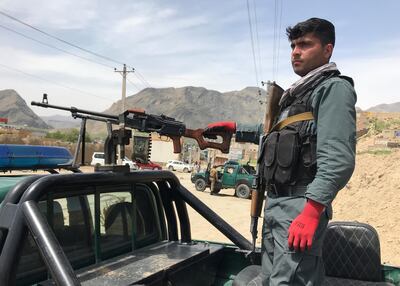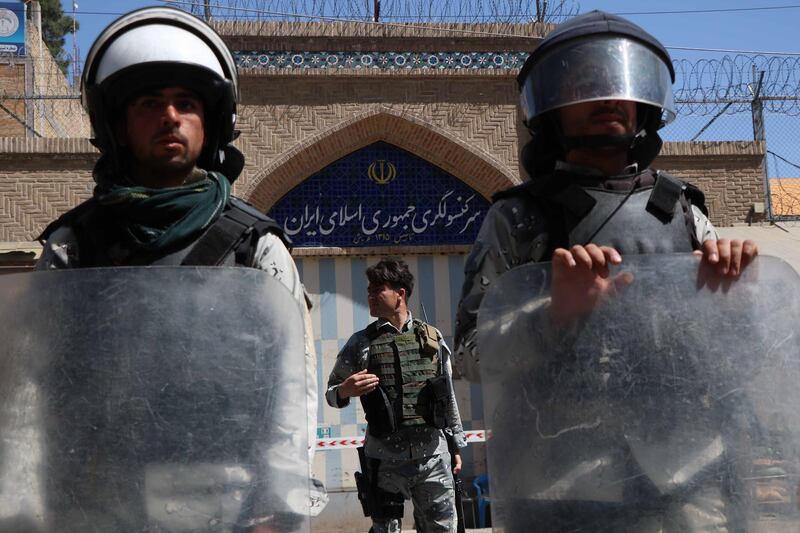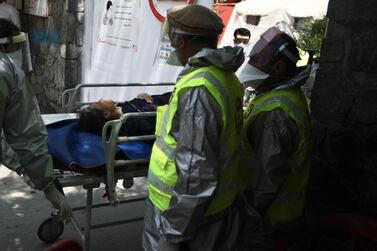In his six years working as a police officer in northern Afghanistan, Azim Khan operated more like a soldier, fighting off countless Taliban attacks instead of arresting criminals.
Now the 25-year-old patrols Kabul, a city choked with drug traffickers, robbers and kidnappers, but many of his colleagues remain stuck on the war's front lines, defending outposts on the edges of rebel-held remote areas.
"I'm not afraid to be a policeman," Mr Khan said during a recent patrol in the Afghan capital. "But many of my colleagues have been killed."
Since the Taliban were ousted in a US-led invasion in 2001, about 37,000 police officers have been killed by the hardline group and the Afghan National Police (ANP) remain the target of at least 70 per cent of insurgent assaults, officials say.
"When the new national police were born after 2001, they were basically asked to fight on the front line, not to fight crime, or to really do policing," said Fabrizio Foschini, a researcher at the Afghan Analysts Network.
But early last year, as talks between the US and the Taliban progressed, the acting interior minister Massoud Andarabi began preparing the beleaguered ANP for a post-conflict Afghanistan.
"Right now one of our major programmes is to have a plan for a peace-time police force, what the Afghan police would look like if we have a peace deal," Mr Andarabi told AFP.
"We are looking into a force that could be able to serve the people's needs," he added, "not only as a fighting element but for law enforcement".

In its bid to transition into a regular crime-fighting force, the ANP has implemented reforms aimed at weeding out corruption, long a scourge among all ranks that has tarnished its reputation.
Just as it hopes to shift the focus to maintaining order, the police have been tasked with protecting the public by enforcing various lockdowns to slow the spread of the coronavirus.
"I have my gloves, I wash my hands, and I put my mask on all the time," Mr Khan said.
Mr Andarabi said the coronavirus crisis meant the interior ministry has temporarily slashed staffing and closed police training centres.
"Certainly our progress on reforms has been slowed down," Mr Andarabi said.
Under a US-Taliban deal signed in February, American and other foreign forces have pledged to withdraw from Afghanistan over the next year and in return the insurgents said they would stick to several security guarantees and hold talks with the government in Kabul, a floundering process that has broken down.
The US has already begun its troop drawdown, despite a surge in violence after the agreement was signed, and questions loom about the added vulnerabilities the police will face after Western forces quit.
Nevertheless, the ANP say they are determined to prepare for a day when the war ends.
Police reform in post-conflict zones has been a challenge faced by many other countries, such as Sierra Leone, the Democratic Republic of Congo and Guatemala, where police forces worked with varying degrees of success to win public trust after long operating as paramilitary groups.
Studies show that for reforms to be effective, police forces need to be free of influence and officers must get a livable salary to reduce the temptation for corruption.
Both these factors are problematic in Afghanistan, where political affiliations often trump national concerns and a reduced international footprint brings with it funding uncertainties.
Already this year, the US has said it will slash $1 billion from its Afghanistan aid budget after political leaders failed to compromise following disputed election results.
Aryan Faizi, the head of Kabul's criminal investigation department, said the country needs educated officers as it pushes to make a "good name for the police".
In the past year, the police have developed an independent recruitment process and a more comprehensive training programme, along with improvements including GPS vehicle tracking and a new control room.
More than 1,000 police personnel including high-ranking officers have been arrested for misconduct amid a tightening of anti-corruption measures.
Meanwhile, the battle with militants grinds on.
This week mothers, babies and nurses were killed when gunmen stormed a hospital in Kabul and and dozens died when a suicide bomber targeted a funeral in eastern Nangarhar province.
At a police hospital in Kabul, wounded police officers described the horrors of working on the front lines.
Taliban "snipers would attack our checkpoint almost every night," said Nesar Ahmad, lying in a bed after being shot in the back in January.
"Of the 14 people in the station, 13 died. I am the only one who survived," added Ahmad, 26, paralysed from the waist down in the attack in the northern province of Kunduz.
Another young policeman was paralysed by a Taliban bullet in the eastern province of Paktika.
"The Taliban are not going to agree to peace," Abdul Fatah said in a weak voice. "But if it comes, I will forgive them."






